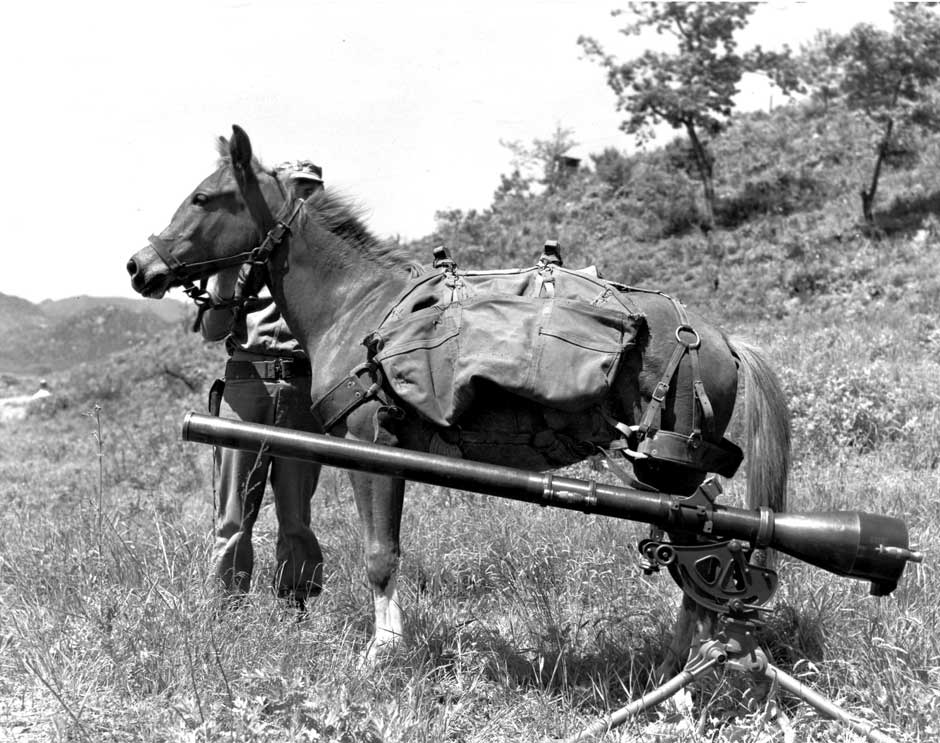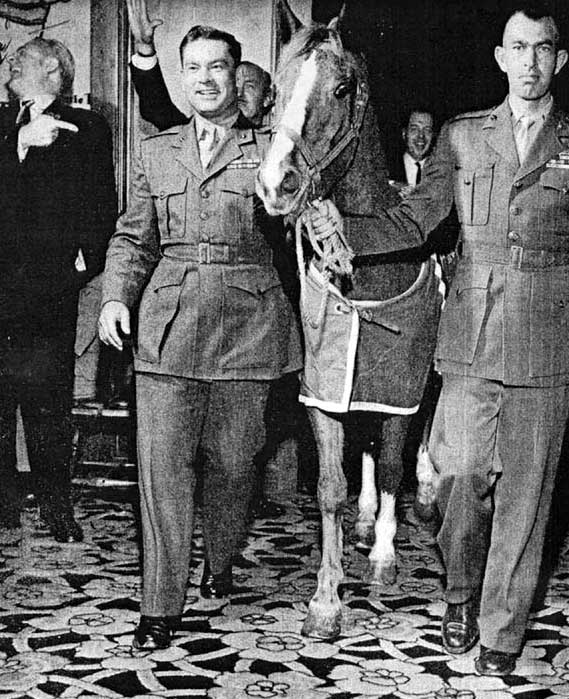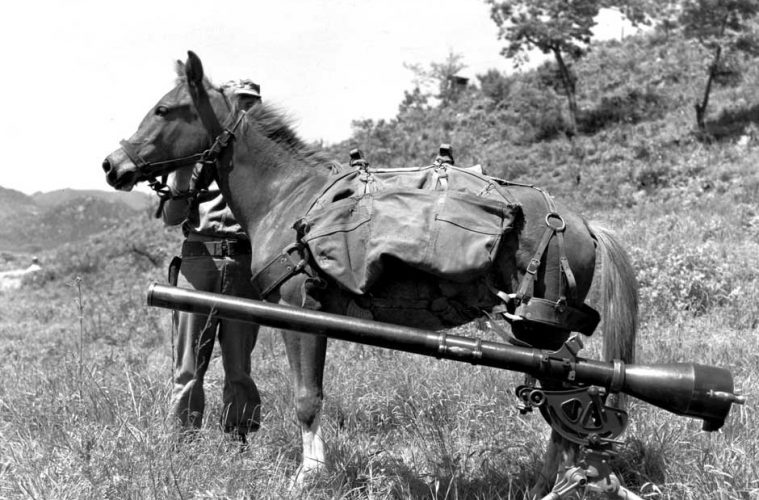She accepted her award at a black tie banquet. Then she ate the floral centerpiece.
Excerpted from the New York Times bestseller, Sgt. Reckless, by Robin Hutton, published by Regenery History.
On April 10, 1954, Reckless was officially promoted to sergeant—an honor never bestowed, before or since, on an animal. There have been animals, especially dogs, which surpassed their roles as military mascots and were recognized with awards and even medals.
No other animal has ever held any legal, officially sanctioned U.S. military rank and been genuinely respected for that rank, except for Reckless. So April 10th was a big day for Reckless and her platoon. Not just because of the promotion, but because Major General Randolph McCall Pate made a special trip to do the honors of presenting Reckless with her sergeant’s stripes.

The company paraded and General Pate “trooped the line.” Sergeant Elmer Lively and Technical Sergeant Dave Woods escorted Reckless into position. Master Sergeant John Strange read the citation: “For meritorious achievement in connection with operations against the enemy while serving with a Marine infantry regiment in Korea from October 26, 1952 to July 27, 1953. Corporal Reckless performed the duties of ammunition carrier in a superb manner. Reckless’s attention and devotion to duty make her well qualified for promotion to the rank of sergeant. Her absolute dependability while on missions under fire contributed materially to the success of many battles…”
Reckless stood at attention as Pate pinned the stripes onto her beautiful, though slightly chewed blanket. The native Korean, born Ah-Chim-Hai and raised to race at a Seoul Thoroughbred track, was now officially a sergeant in the United States Marine Corps. Navy Corpsman Doc Rogers was there that day. “They broke us all out in formation,” Rogers remembered, describing the formal gathering, at attention and by rank, “and they had Reckless there. And they had her corporal blanket on—had corporal stripes on the side of it, had all of her ribbons on there—and they promoted her to sergeant.
“They took the old blanket off and put the new blanket on her that had the sergeant stripes on there. And, of course, the same ribbons. It was the most beautiful horse blanket I ever saw.

“But, you know, I think back on that and I think she just acted like she knew everything that was going on. She just stood still. They read off everything and it was almost like she was just a part of it. She knew what was happening. She was a proud Marine.”
The time had come for Reckless to meet the press. The ship was so jammed with reporters and photographers that one veteran newsman observed wryly, “She has more cameras and reporters to meet her than Vice President Nixon had a week ago when he came to town.” The San Francisco Examiner reported, “Not since the days when troopships were coming back from the Korean War had the waterfront seen such a welcome as that given the fighting veteran at Pier 7 yesterday.” Reckless was in her glory. For more than an hour, she “posed with various Marines, she ate carrots, she walked into and out of her stall a dozen times while flash bulbs popped and cameramen shouted for different poses.
Then she became bored and let her handlers know it.” It was time to go.
From the docks, Reckless and her entourage headed straight to a reception in her honor at the Marines’ Memorial Club arranged by Major General Evans O. Ames.
The November 1954 Anniversary Issue of Crossroads of the Corps, the Marines’ Memorial Association magazine, devoted its cover to Technical Sergeant Joe Latham and Reckless. The feature story previewed how Reckless “will make an unprecedented appearance as the honored guest…and be given due recognition” at her stateside “coming out” party—the annual Marine Corps Birthday Dinner and Dance. Reservations for the event reportedly were “in extremely heavy demand,” as it promised to include a memorable salute to America’s most unlikely war heroine.
The press went wild when Reckless, clip-clopping onto the club’s historic theater stage, was greeted by at least 50 cheering Marines. When calm returned, she was toasted again and again—with Coca-Cola. Poor Reckless. She was a decorated war heroine and belle of the ball, yet she had to consider her pristine public image. So when a photographer suggested that, in print, the caramel-colored soft drink could be mistaken for alcohol, Reckless obliged and also drank a glass of milk.

After a brief respite, Reckless strode into the freight elevator, adjusted her stance to fit more comfortably, then rode confidently to the tenth floor’s banquet dinner in the main dining room. Escorted off the elevator by Lieutenant Eric Pedersen and Sergeant Elmer Lively, the little mare strode into the banquet hall of 400 Marines and their dates to thunderous applause as “flash bulbs popped like mortar shells along the Main Line of Resistance.” Keynote speaker Colonel Andy Geer regaled his audience with “the story of Reckless’s transition from a racing pony to a traditional Marine Corps hero.” While being introduced to the crowd, Reckless “spied a two-foot- high anniversary cake and before Pedersen or Lively could restrain her, she was up to her nostrils in it. She sighed gustily. This was the best food she had since the peanut butter sandwiches in Korea. When the cake was gone, Mrs. Veda Ames, wife of Major General Evans O. Ames, USMC, leaned far over the table and served Reckless ice cream from her hand.” But for the famished filly, these were mere appetizers. During the speeches, Reckless started in on the rose and carnation centerpieces.

